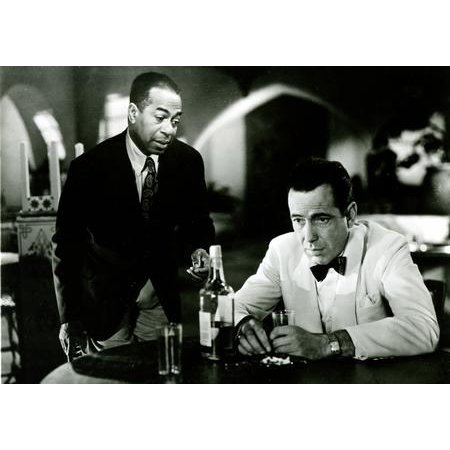
Voted #1 in the Writers Guild of America list of the 101 Greatest Screenplays, Casablanca is a classic that’s still as entertaining and moving as when it debuted in 1942. What can one possibly say about this beloved film that hasn’t been said already?
According to Umberto Eco, everyone loves Casablanca because it’s a pastiche of genres; it’s not a movie it’s “movies:”
Casablanca brings with it, like a trail of perfume, other situations that the viewer brings to bear on it quite readily, taking them without realizing it from films that only appeared later, such as To Have and Have Not where Bogart actually plays a Hemingway hero, while here in Casablanca he already attracts Hemingwayesque connotations by the simple fact that Rick, so we are told, fought in Spain (and, like Malraux, helped the Chinese Revolution). Peter Lorre drags in reminiscences of Fritz Lang; Conrad Veidt envelops his German officer in a faint aroma of The Cabinet of Dr. Caligari — he is not a ruthless, technological Nazi, but a nocturnal and diabolical Caesar.
Umberto Eco
Maybe. But then again, doesn’t the same apply for other Hollywood classics of the era? The movie stars and character actors of Hollywood’s Golden Age were not the kind of players who disappeared into roles; they were good actors, don’t get me wrong, but they didn’t have that spooky quality of becoming other people; that ability to subsume their personalities and truly become someone wholly different. Some rare actors truly possess that gift. Bogart might be the heavy in The Treasure of the Sierra Madre, the romantic lead in Sabrina and the hero in Key Largo, yet in every role he is recognizably Bogie. And the same can be said not just for the rest of the cast, but for all the actors of the studio era. Something ineffably distinctive came through the screen. Part of the pleasure we derive from those old performances comes from the sensation of being in their company.
This time around, I was struck by the fact that at the beginning, Rick Blaine is an asshole. He’s not just a jilted lover, he’s not just indifferent to the war and those it affects, he’s bitter, self-pitying and cynical. You get the sense that he’s ready and willing to take out his pain on anyone: willfully insinuating that Ilsa is a whore; turning away as the gendarmes shoot Ugarte per Nazi orders; barking at Sam, his loyal best friend.
In “Everybody Comes to Rick’s,” the stage play that was the basis for the movie, the Ilsa character actually was a promiscuous American woman named Lois. But by changing her into Ilsa, an idealistic young Swedish woman, and casting Ingrid Bergman, the scriptwriters crystalized an essential aspect of Rick’s character and of the movie’s appeal. With the downturn cast of his lips, and perpetually creased brow, Bogie has the mug of someone who’s had his share of bad knocks–and is expecting more on the way. He’s perfectly cast as the cynical Rick who avers, one too many times, that he “sticks his neck out for no one.” Still, as badly as Rick behaves, we understand him. We’ve all had our heart broken, we’ve all sunk deep into self-pity, drinking our woes away as we listen to sad love songs…
Rick’s journey from self-absorbed bastard to his eventual realization that “the troubles of three little people don’t amount to a hill of beans in this crazy world” leads him to sacrifice the possibility of finally reuniting with the woman he loves. That moment of nobility makes the ending transcendental and inspiring. Jules and Philip Epstein studded the script with the kind of breezy, playful dialogue that blunted its more sentimental aspects, lending the interactions a fizzy sophistication that undercuts the moral question at its core: When evil is winning, what’s the point of being good?
When the movie came out, in the middle of the most devastating war in human history, no one knew the answer to that question. In 1942, the Germans really were winning, American soldiers were green and the battle for Stalingrad, the war’s bloodiest confrontation, had begun barely three months before. Like the refugees stuck in Casablanca, many were still struggling to escape the Nazi menace. Most of them failed. Bogie’s sacrifice must’ve seemed like a real gamble, and a worthless one at that.
It’s always moving to see a regular guy unexpectedly find something great within himself–especially if we’ve experienced that same guy at his worst. That tale will always touch us because, regardless of any prevailing cynicism and selfishness, we still want to believe we’re capable of sublime nobility.

Your style is unique in comparison to other people I’ve read stuff from.
I appreciate you for posting when you have the opportunity, Guess I will just bookmark
this blog.